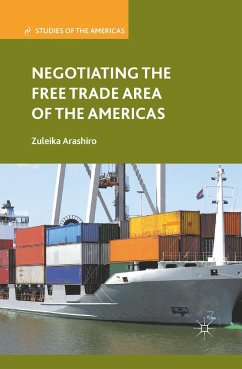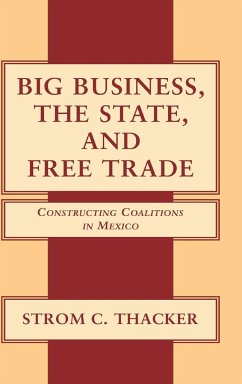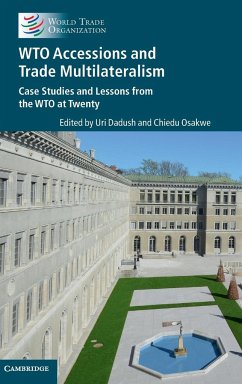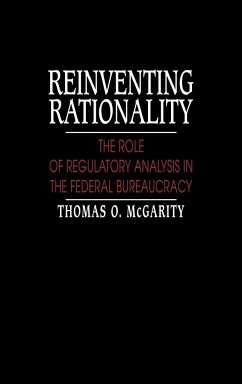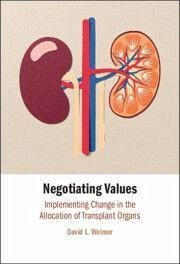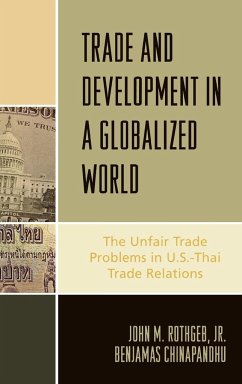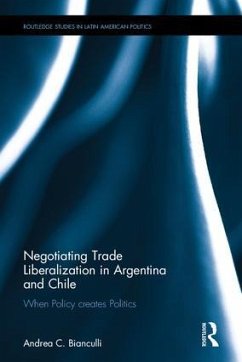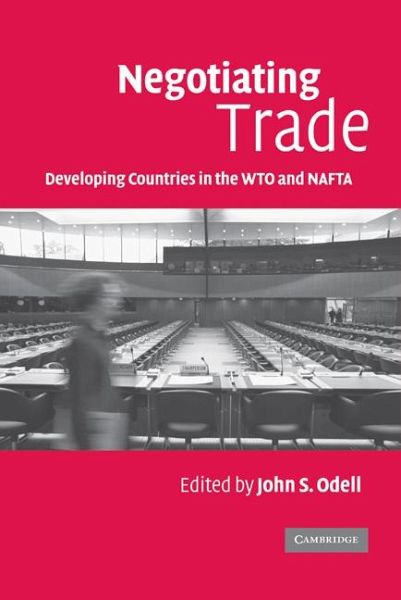
Negotiating Trade
Developing Countries in the Wto and NAFTA
Herausgeber: Odell, John S.
Versandkostenfrei!
Versandfertig in 1-2 Wochen
111,99 €
inkl. MwSt.
Weitere Ausgaben:

PAYBACK Punkte
56 °P sammeln!
Sheds light on international trade negotiations, and the ways developing countries can succeed in them.Negotiations between governments shape the world political economy and in turn the lives of people everywhere. Developing countries have become far more influential in talks in the World Trade Organization, including infamous stalemates in Seattle in 1999 and Cancún in 2003, as well as bilateral and regional talks like those that created NAFTA. Yet social science does not understand well enough the process of negotiation, and least of all the roles of developing countries, in these situati...
Sheds light on international trade negotiations, and the ways developing countries can succeed in them.
Negotiations between governments shape the world political economy and in turn the lives of people everywhere. Developing countries have become far more influential in talks in the World Trade Organization, including infamous stalemates in Seattle in 1999 and Cancún in 2003, as well as bilateral and regional talks like those that created NAFTA. Yet social science does not understand well enough the process of negotiation, and least of all the roles of developing countries, in these situations. This book sheds light on three aspects of this otherwise opaque process: the strategies developing countries use; coalition formation; and how they learn and influence other participants' beliefs. This book will be valuable for many readers interested in negotiation, international political economy, trade, development, global governance, or international law. Developing country negotiators and those who train them will find practical insights on how to avoid pitfalls and negotiate better.
Review quote:
'Now that the developing countries are negotiating their trade liberalization in bilateral and multilateral contexts, after decades of opting out, they must learn the kinds of strategic bargaining behaviour that the richer countries have developed over the course of postwar trade liberalization largely among themselves. This book, under the leadership of John Odell, a most distinguished political scientist with a remarkable track record in analyzing trade policy, enables them to do just that, drawing on recent experience of the developing countries also. It is not merely fascinating; it is also an invaluable resource book for the leadership of the developing countries.' Jagdish Bhagwati University Professor, Columbia University; author of In Defense of Globalization
'By focusing attention on the strategies employed by the developing world in trade talks, Odell enriches out understanding of trade negotiations. This unique collection of wide ranging articles by recognized experts in the field will be indispensable to scholars on the GATT-WTO system and is a sure read for anyone interested in contemporary trade issues.' Judith Goldstein, Professor, Department of Political Science, Stanford University
'- the Odell studies attempt to develop hypotheses and a future research agenda - the book is a major landmark in this field: clarifying what is known and identifying what type of evidence will take the analysis further.' Development Policy Review
Table of contents:
List of figures; List of tables; List of contributors; Acknowledgements; 1. Introduction John S. Odell; Part I. Multilateral Negotiations: 2. The evolution of national interests: new issues and North-South negotiations during the Uruguay Round J. P. Singh; 3. Reframing the issue: the WTO coalition on intellectual property and public health, 2001 John S. Odell and Susan K. Sell; 4. The strict distributive strategy for a bargaining coalition: the like minded group in the World Trade Organization, 1998-2001 Amrita Narlikar and John S. Odell; 5. Learning in multilateral trade negotiations: some results from simulation for developing countries Cédric Dupont, Cosimo Beverelli and Stéphanie Pézard; Part II. Regional Negotiations: 6. Getting to 'no': defending against demands in NAFTA energy negotiations Antonio Ortiz Mena L. N.; Part III. WTO Dispute Settlement Negotiations: 7. Do WTO rules create a level playing field? Lessons from the experience of Peru and Vietnam Christina L. Davis; 8. Compliance bargaining in the WTO: Ecuador and the bananas dispute James McCall Smith; Index.
Negotiations between governments shape the world political economy and in turn the lives of people everywhere. Developing countries have become far more influential in talks in the World Trade Organization, including infamous stalemates in Seattle in 1999 and Cancún in 2003, as well as bilateral and regional talks like those that created NAFTA. Yet social science does not understand well enough the process of negotiation, and least of all the roles of developing countries, in these situations. This book sheds light on three aspects of this otherwise opaque process: the strategies developing countries use; coalition formation; and how they learn and influence other participants' beliefs. This book will be valuable for many readers interested in negotiation, international political economy, trade, development, global governance, or international law. Developing country negotiators and those who train them will find practical insights on how to avoid pitfalls and negotiate better.
Review quote:
'Now that the developing countries are negotiating their trade liberalization in bilateral and multilateral contexts, after decades of opting out, they must learn the kinds of strategic bargaining behaviour that the richer countries have developed over the course of postwar trade liberalization largely among themselves. This book, under the leadership of John Odell, a most distinguished political scientist with a remarkable track record in analyzing trade policy, enables them to do just that, drawing on recent experience of the developing countries also. It is not merely fascinating; it is also an invaluable resource book for the leadership of the developing countries.' Jagdish Bhagwati University Professor, Columbia University; author of In Defense of Globalization
'By focusing attention on the strategies employed by the developing world in trade talks, Odell enriches out understanding of trade negotiations. This unique collection of wide ranging articles by recognized experts in the field will be indispensable to scholars on the GATT-WTO system and is a sure read for anyone interested in contemporary trade issues.' Judith Goldstein, Professor, Department of Political Science, Stanford University
'- the Odell studies attempt to develop hypotheses and a future research agenda - the book is a major landmark in this field: clarifying what is known and identifying what type of evidence will take the analysis further.' Development Policy Review
Table of contents:
List of figures; List of tables; List of contributors; Acknowledgements; 1. Introduction John S. Odell; Part I. Multilateral Negotiations: 2. The evolution of national interests: new issues and North-South negotiations during the Uruguay Round J. P. Singh; 3. Reframing the issue: the WTO coalition on intellectual property and public health, 2001 John S. Odell and Susan K. Sell; 4. The strict distributive strategy for a bargaining coalition: the like minded group in the World Trade Organization, 1998-2001 Amrita Narlikar and John S. Odell; 5. Learning in multilateral trade negotiations: some results from simulation for developing countries Cédric Dupont, Cosimo Beverelli and Stéphanie Pézard; Part II. Regional Negotiations: 6. Getting to 'no': defending against demands in NAFTA energy negotiations Antonio Ortiz Mena L. N.; Part III. WTO Dispute Settlement Negotiations: 7. Do WTO rules create a level playing field? Lessons from the experience of Peru and Vietnam Christina L. Davis; 8. Compliance bargaining in the WTO: Ecuador and the bananas dispute James McCall Smith; Index.





